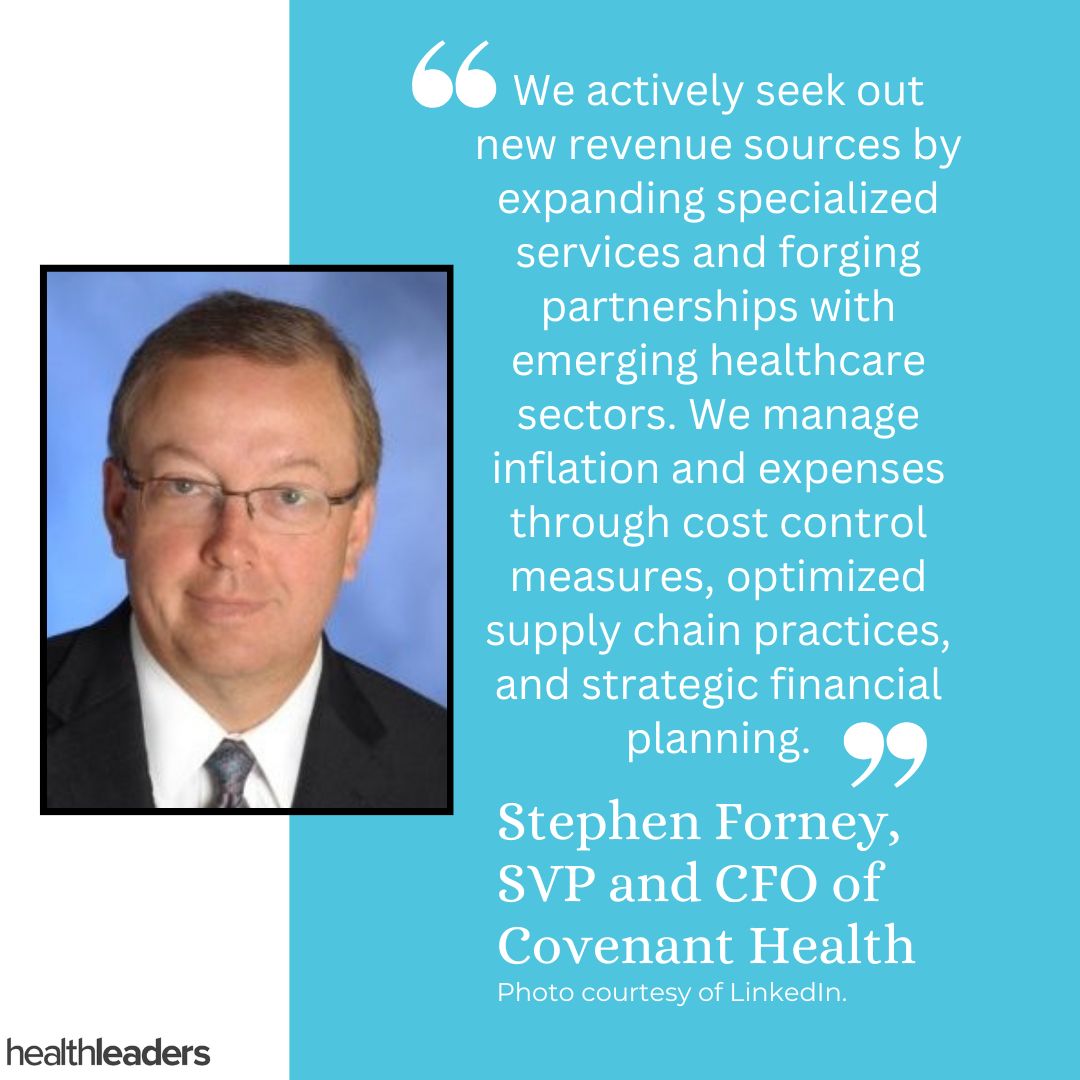From integrating AI to exploring shifts in profit pools and business model adjustments, the health system CFO is working to ensure long-term sustainability.
CFOs will continue to fight against poor operating margins, reduced reimbursement, and inflated expenses well into 2024.
Hospitals and health systems of every type are feeling the financial pressure—even the largest of systems will continue to grapple with existential questions about their strategy and structure moving forward.
As a multi-state health system, Massachusetts-based Covenant Health knows all too well about the incessant financial battles healthcare organizations have been facing for years now.
But Covenant has a plan.
Through integrating AI, exploring shifts in profit pools, prioritizing its employees, and fighting “financial toxicity,” Stephen Forney, SVP and CFO of Covenant Health says it has a path to ensuring financial stability.
HealthLeaders: What are the most significant financial challenges you see impacting hospitals and health systems? Why are these challenges so persistent?
Stephen Forney: The rising cost of healthcare presents a major financial challenge for hospitals and health systems. Patients with serious, long-term, chronic illnesses such as cancer sometimes experience financial toxicity due to the high expenses associated with their treatments. Consequently, patients may experience treatment delays or prematurely discontinue their treatments, potentially compromising their overall outcomes and often driving up costs of care further.
It's in our best interest as healthcare providers to identify ways to proactively head off financial toxicity and ensure that our most vulnerable patients can access and afford the care they need. In light of this, we have seen hospital patient financial assistance programs shift from a ‘nice-to-have’ to a critical asset for both providers and patients looking to stay afloat amid rising patient financial responsibility.
HealthLeaders: What strategies are you using to tackle these challenges?
Forney: To tackle financial challenges in healthcare, hospitals typically look at strategies such as optimizing operational efficiency, implementing new payment models, exploring partnerships, and investing in innovative technology. At Covenant, we've seen how AI can play a crucial role in addressing financial challenges by streamlining workflows and improving revenue cycle management. We leverage an automated philanthropic aid platform, Atlas Health, that helps keep us up to date on the latest aid programs, alerts us when they're open for enrollment, and helps match our patients to the program they're best suited for, streamlining the process significantly for all stakeholders. Integrating AI into our systems promotes efficient resource utilization and better financial outcomes.
HealthLeaders: How is Covenant Health prioritizing its employees? Where is the organization investing funds to ensure employees work to the best of their abilities in a supportive environment?
Forney: Covenant Health places a strong emphasis on supporting the well-being of its employees. We invest in various initiatives to achieve this goal, including employee training and development programs, competitive compensation, and benefits packages, and fostering a positive work culture. Recognizing the link between employee engagement, patient outcomes, and organizational success, we allocate funds to create a supportive environment, invest in adequate staffing levels, and provide resources for professional growth.

HealthLeaders: How is Covenant Health handling dynamic market changes?
Forney: Covenant Health proactively responds to dynamic market changes through vigilant monitoring of industry trends and strategic adaptations. This involves exploring shifts in profit pools and potential adjustments to the business model, ensuring long-term sustainability. We actively seek out new revenue sources by expanding specialized services and forging partnerships with emerging healthcare sectors. We manage inflation and expenses through cost control measures, optimized supply chain practices, and strategic financial planning.
HealthLeaders: Talk to me about supply chain optimization and shortage considerations—how are you meeting increasing costs with supplies, services, and technology investments?
Forney: Covenant Health prioritizes supply chain optimization to address increasing costs and mitigate shortages. We closely collaborate with vendors and suppliers to ensure the availability of essential supplies and services while negotiating favorable pricing agreements. Strategic partnerships with suppliers and proactive inventory management help streamline operations and reduce expenses. Furthermore, we make technology investments to enhance supply chain efficiency, implementing inventory tracking systems and adopting automation to streamline procurement processes.
Amanda Norris is the Director of Content for HealthLeaders.
KEY TAKEAWAYS
Covenant Health knows all too well about the incessant financial battles healthcare organizations have been facing for years now.
But through integrating AI, exploring shifts in profit pools, prioritizing its employees, and fighting “financial toxicity,” Covenant Health has a path to ensuring financial stability.
